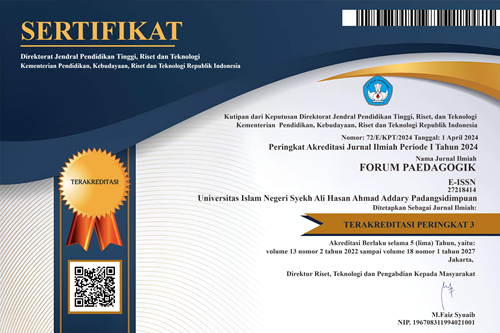EXPLORING MALAYSIAN STUDENTS’ MATHEMATICAL THINKING SKILLS
Keywords : Mathematical Thinking,;Mathematical Test Instrument; Rasch Model, Thinking Ability
Alcock, L., & Weber, K. (2010). Referential and syntactic approaches to proving: Case studies from a transition-to-proof course. Research in collegiate mathematics education VII, 7, 93.
Amit, M., & Neria, D. (2008). “Rising to the challenge”: Using generalization in pattern problems to unearth the algebraic skills of talented pre-algebra students. ZDM, 40, 111129.Atmowardoyo, H. (2018). Research methods in TEFL studies: Descriptive research, case study, error analysis, and R & D. Journal of Language Teaching and Research, 9(1), 197-204.
Bakker, A., Cai, J., & Zenger, L. (2021). Future themes of mathematics education research: An international survey before and during the pandemic. Educational Studies in Mathematics, 107(1), 1-24.
Bobis, J., Khosronejad, M., Way, J., & Anderson, J. (2020). “Sage on the stage” or “meddler in the middle”: shifting mathematics teachers’ identities to support student engagement. Journal of Mathematics Teacher Education, 23(6), 615-632.
Calder, N., Jafri, M., & Guo, L. (2021). Mathematics education students’ experiences during lockdown: Managing collaboration in eLearning. Education Sciences, 11(4), 191.
Celik, H. C., & Ozdemir, F. (2020). Mathematical Thinking as a Predictor of Critical Thinking Dispositions of Pre-Service Mathematics Teachers. International Journal of Progressive Education, 16(4), 81-98.
Chua, B. L. (2016). Justification in Singapore secondary mathematics. In Developing 21st Century Competencies In The Mathematics Classroom: Yearbook 2016, Association of Mathematics Educators (pp. 165-187).
Conner, A., Singletary, L. M., Smith, R. C., Wagner, P. A., & Francisco, R. T. (2014). Identifying kinds of reasoning in collective argumentation. Mathematical Thinking and Learning, 16(3), 181-200.
Creswell, J. W. (2012). Educational research: Planning, conducting, and evaluating quantitative and qualitative research. Pearson Education, Inc.
Davies, B., Alcock, L., & Jones, I. (2021). What do mathematicians mean by proof? A comparative-judgement study of students’ and mathematicians’ views. The Journal of Mathematical Behavior, 61, 100824.
Deliyianni, E., Gagatsis, A., Elia, I., & Panaoura, A. (2016). Representational flexibility and problem-solving ability in fraction and decimal number addition: A structural model. International Journal of Science and Mathematics Education, 14, 397-417.
Dubinsky, E., Mcdonald, M.A. (2001). APOS: A Constructivist Theory of Learning in Undergraduate Mathematics Education Research. In: Holton, D., Artigue, M., Kirchgräber, U.,
Hillel, J., Niss, M., Schoenfeld, A. (eds) The Teaching and Learning of Mathematics at University Level. New ICMI Study Series, vol 7. Springer, Dordrecht. https://doi.org/10.1007/0-306-47231-7_25
Fischer, H. E., Boone, W. J., & Neumann, K. (2023). Quantitative research designs and approaches. In Handbook of research on science education (pp. 28-59). Routledge.
Herbert, S. (2021). Overcoming challenges in assessing mathematical reasoning. Australian Journal of Teacher Education (Online), 46(8), 17-30.
Ilyas, M., Meiyani, E., Ma’rufi, M. R., & Kaewhanam, P. (2022, October). Improving students’ ability in learning mathematics by using the science, technology, engineering, and mathematics (STEM) approach. In Frontiers in Education (Vol. 7, p. 966687). Frontiers Media SA.
Karadag, Z. (2010). Analyzing students' mathematical thinking in technology-supported environments (Doctoral dissertation, University of Toronto).
Katagiri, S. (2004). Mathematical thinking and how to teach it. CRICED, University of Tsukuba.
Khalid, M., Yakop, F. H., & Ibrahim, H. (2020). Year 7 students' interpretation of letters and symbols in solving routine algebraic problems. The Qualitative Report, 25(11), 41674181.
Khalil, M. (2019). Concept process with mathematical thinking tools under the domain of Piaget’s theory of cognitive development. JCTE, 3.
Lesh, R., Yoon, C., & Zawojewski, J. (2020). John Dewey revisited—making mathematics practical versus making practice mathematical. In Foundations for the future in mathematics education (pp. 315-348). Routledge.
Mukuka, A., Balimuttajjo, S., & Mutarutinya, V. (2023). Teacher efforts towards the development of students’ mathematical reasoning skills. Heliyon, 9(4).
National Research Council. (2012). Education for STEM literacy: Thinking critically in a digital age. National Academies Press.
PISA, O. (2012). Results in focus 2014-02-17. http://www,oecd. org/pisa/keyfindings/ pisa2012-results-o-verview,pdf.
Rivera, F. D. (2018). Pattern generalization processing of elementary students: Cognitive factors affecting the development of exact mathematical structures. Eurasia Journal of Mathematics, Science and Technology Education, 14(9), em1586.
Schoenfeld, A. H. (2016). Learning to think mathematically: Problem solving, metacognition, and sense making in mathematics (Reprint). Journal of education, 196(2), 1-38.
Scusa, T. (2008). Five processes of mathematical thinking.Sengupta, P., Jonassen, D. H., & Lee, C. B. (2017). Effects of teaching for mathematical thinking on students’ problem-solving skills: A meta-analysis. Journal for Research in Mathematics Education, 48(2), 165-198.
Sfard, A. (1991). On the dual nature of mathematical conceptions: Reflections on processes and objects as different sides of the same coin. Educational studies in mathematics, 22(1), 1-36.
Stacey, K. (2006). What is mathematical thinking and why is it important. Progress report of the APEC project: collaborative studies on innovations for teaching and learning mathematics in different cultures (II)—Lesson study focusing on mathematical thinking.
Stacey, K., & MacGregor, M. (2016). Mathematical thinking: Why, what, and how. ZDM Mathematics Education, 48(3), 327-334.Stylianides, A. J. (2019). Understanding and characterizing student reasoning in mathematics classrooms. ZDM Mathematics Education, 51(1), 1-16.
Sukamolson, S. (2007). Fundamentals of quantitative research. Language Institute Chulalongkorn University, 1(3), 1-20.
Swidan, O., & Tall, D. (2019). Metacognition and mathematical thinking. ZDM Mathematics Education, 51(3), 429-441.Turşucu, S., Spandaw, J., & de Vries, M. J. (2020). The effectiveness of activation of prior mathematical knowledge during problem-solving in physics.
Weber, K. (2010). Mathematics majors' perceptions of conviction, validity, and proof. Mathematical thinking and learning, 12(4), 306-336.Yayuk, E., & As' ari, A. R. (2020). Primary School Students' Creative Thinking Skills in Mathematics Problem Solving. European Journal of Educational Research, 9(3), 12811295.
Yunus, A. S. M. (2015). Developing Students' Mathematical Thinking: How Far Have We Come?. Penerbit Universiti Putra Malaysia.
 Copyright (c) 2023 Hasniza Ibrahim, Tunku Badariah Tunku Ahmad, Norshahira Isa
Copyright (c) 2023 Hasniza Ibrahim, Tunku Badariah Tunku Ahmad, Norshahira Isa

This work is licensed under a Creative Commons Attribution-ShareAlike 4.0 International License.











